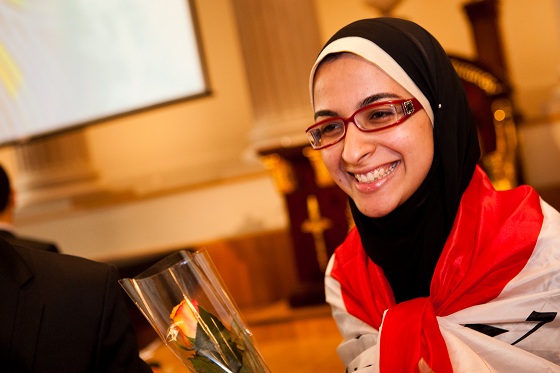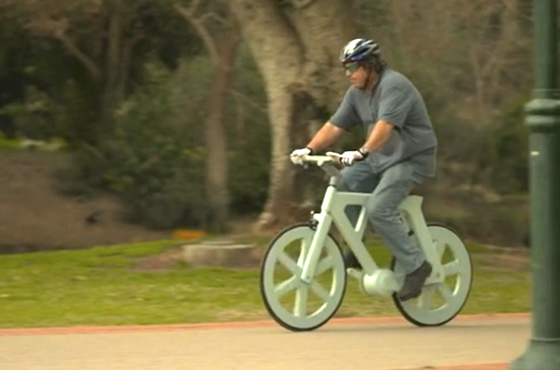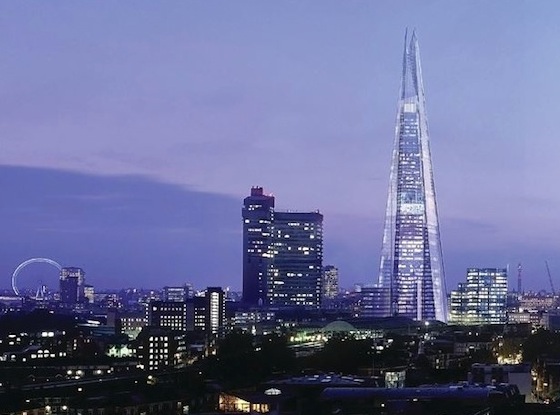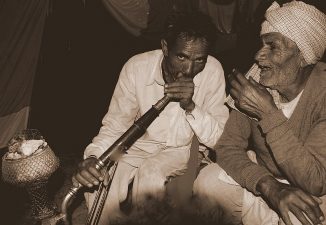 Every year we like to round up a list of our most popular stories from the preceding year. Not only does this give us a sense of closure, but it also helps us better understand what our readers want. This year our readers have been following a range of subjects that affect the health of our planet, including energy, food, and wildlife stories.
Every year we like to round up a list of our most popular stories from the preceding year. Not only does this give us a sense of closure, but it also helps us better understand what our readers want. This year our readers have been following a range of subjects that affect the health of our planet, including energy, food, and wildlife stories.
Thousands of readers were enthralled by the cardboard bicycle from Israel and the Egyptian scientist who discovered a way to generate biofuel from plastic. McDonalds finally succumbed to international pressure to drop pink slime from their menu, and The Shard by starchitect Renzo Piano, which was financed by Qatar, was finally inaugurated in London. Hit the jump to see these and other stories that captivated our readers in 2012.
1. Cardboard Bike From Israel Makes Green Cycling Easier

Nobody, least of all inventor Izhar Gafni, could have predicted the popularity of Israel’s $9 cardboard bike. Perfected after a series of false starts, this extraordinary design made from recycled cardboard can handle everything that would seem impossible – including moisture and weight. Gafni and his partner became so popular they had to hire someone to respond to all the email inquiries they received from every reach of the globe. And now they’re working on commercializing the product, along with cardboard wheelchairs for Africa.
2. Are ESL’s a Mercury-Free Replacement for CFL Lights
In 2012 we brought on a new science writer Brian Nitz, who wrote this fantastic piece about ESL’s and CFL lights, and our readers hung on every word. “If only there were a light bulb as efficient as a compact fluorescent light (CFL), but without the ghastly green light and brain-eating toxic mercury,” Brian wrote before proceeding to complete a thorough analysis of Electron Stimulated Luminance (ESL) lights. The popularity of this post revealed to what extent our readers are concerned to reduce their energy consumption, but not to the detriment of health.
3. Biofuels from Plastic for Young Egyptian Scientist
Just 16 years old, Azza Abdel Hamid Faiad from the Zahran Language School in Alexandria discovered a new catalyst that facilitates the conversion of plastic into biofuels. As soon as news of this hit the blogging world, Faiad became an international sensation. This is due in part to the context in which her inspiring story came to light. Egypt has spent the last year lifting its head over a wall of socio-political problems such that basic goods and services have been neglected and the economy has tanked. The country needed good news and so did you – our readers.
4. Dead Dugong With ‘Tears of Blood’ Found in Egypt
People aren’t suffering Egypt’s transition alone. With opportunists keen to exploit Egypt’s all-time sluggish regulatory environment in order to make a fast buck, a host of new developments are being planned without any of the necessary environmental oversight. Nowhere is this more true than the Sinai Peninsula, which has long been a haven for foreigners, and the Red Sea is suffering the consequences. Recently a dead dugong that was discovered quickly became a symbol of the tragedy that has befallen Egypt’s wild creatures.
5. Renzo Piano’s The Shard Inaugurated
 As Europe and the United States continue to battle severe economic problems, Gulf nations are quietly building up their economies on the back of fossil fuel sales. Qatar has cast a particularly wide net. In addition to developing several projects back home, such as the solar-powered World Cup stadiums, the emirate stepped in to finance Renzo Piano’s controversial pyramidal structure in London. The latest tallest building to dominate Western Europe, the tower is 1,016 feet tall and 95% of it is owned by the government of Qatar.
As Europe and the United States continue to battle severe economic problems, Gulf nations are quietly building up their economies on the back of fossil fuel sales. Qatar has cast a particularly wide net. In addition to developing several projects back home, such as the solar-powered World Cup stadiums, the emirate stepped in to finance Renzo Piano’s controversial pyramidal structure in London. The latest tallest building to dominate Western Europe, the tower is 1,016 feet tall and 95% of it is owned by the government of Qatar.
6. Abu Dhabi’s Electric Superbus
Probably more than any other Gulf nation, Abu Dhabi has surged ahead with a host of sustainable initiatives. Masdar continues to grow from strength to strength, forging connections with forward thinking progressives across the globe in order to make the emirate more resilient to climate, energy and hydrological challenges, and various government agencies have implemented other initiatives. However, the emirate tends to add a touch of extravagance to just about everything it does, which is certainly true of the electric Superbus – a 15 meter long luxurious commuter vehicle that was certified as road legal this year.
7. Pink Slime
Nothing hooks readers better than a title like Pink Slime, and so it should. Used for years in fast food chains as a meat enhancer, ammonium hydroxide is also said kill e-coli bacteria – a common problem when using meat scraps to create meat patties. When news broke alongside a series of disturbing images of a pink foam substance, outrage ensued and McDonalds and other restaurant chains were forced to find an alternative.
8. Cooking Pans That Kill With Color
Slightly less inspirational than the cardboard bicycle, this story from Israel caused all kinds of drama. An Israeli consumer protection show called Kolbotek alleged that ceramic cookware may be damaging to health as it may contain lead and cadmium, which cause a number of serious medical problems such as brain damage and cancer. One company in particular – Neoflam – was signaled out and subsequently filed a law suit against the TV show.
9. Underwater Hotel Plans Revived in Dubai
Dubai has pitched a slew of insane projects over the years. Some have soared, like the Burj Dubai, while others have yet to reach fruition. We thought the The Water Disqus Hotel (WDH) would inevitably fail, but the plans have been revived and the project’s new investment team has received exclusive rights to build in all Gulf Cooperation Council (GCC) countries. Which means that in time, wealthy residents of Dubai and other Gulf countries could soon spend the night underwater looking at whatever pretty fish are left to see.
Thanks for reading folks! Happy 2013 from all of us at Green Prophet.




Laura, wow. Thanks. You made us blush…. Happy New Year!
I am not sure if you have heard of a journalist called
Paul Harvey, he had a radio show in America for a very very very very
loooooooonnnnggggg time.
His show was called, ‘The rest of the story’
And that is what I consider ‘The Green Prophet’
The New York Times tells the world about only a small portion of the peoples of the Middle East. Eveyday I read the New York Times and everyday it tells me the same story. The New York Times only tells ONE story about the peoples of the Middle East and North Africa.
‘The Green Prophet’ tells me ……’the rest of the story’
Again, thank you for being journalists.
Just wanted to send a note about how important your work truly is….
I just scanned the New York Times and is the same as every day, there is a story about brutality in the Middle East and North Africa.
I believe that the ecological work that you are doing is important enought to mention in my master’s school application to the University of Arizona.
Yet, what I truly vaule about ‘The Green Prophet’ is that I can read your journalism and hear positive, inspiring and innovative stories about the human beings that live in the Middle East and North Africa.
All the peoples of the Middle East and North Africa long to hear postive things about themselves and their culture. They need positive role-models who are acheiving, sucessful and peaceful.
The Green Prophet has never failed to provide me inspiration about ‘what is’ and ‘what can be.’
I wanted to sincerely the staff of the Green Prophet
for the important work of modeling postive, peaceful, ethical, behavior
and for reporting on the side of the Middle East and North Africa
that we so rarely hear about in the American Press.
Peace be with you,
Laura Roche
Laura,
Thank you so much for this positive feedback. We do try to be a positive voice for the MENA region, and are deeply encouraged when our readers notice. Best of luck with your application to the University of Arizona.
Warmly,
Tafline